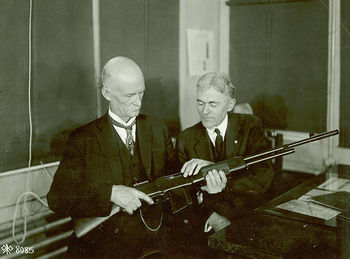Browning Automatic Rifle: Difference between revisions
imported>George Swan (more details) |
imported>George Swan (more details) |
||
| Line 22: | Line 22: | ||
significant weight to the weapon. The tripod and ammunition boxes added even more weight, and hte guns sometimes required a cart to transport them. | significant weight to the weapon. The tripod and ammunition boxes added even more weight, and hte guns sometimes required a cart to transport them. | ||
--> | --> | ||
}} | |||
</ref><ref> | |||
{{cite book | |||
| isbn = | |||
| url = http://books.google.ca/books?id=VWkYoAkoMHIC&pg=PA72&lpg=PA72&dq=%22Browning+Automatic+Rifle%22&source=bl&ots=HEw0lNirq5&sig=0A9iiC1SGhEhDNhYiCRx3Db9IDg&hl=en&sa=X&ei=_aIiULKQK4K69QTqw4HgBA&ved=0CEEQ6AEwAw#v=onepage&q=%22Browning%20Automatic%20Rifle%22&f=false | |||
| title = Machine Guns: An Illustrated History of Their Impact | |||
| author = James H. Willbanks | |||
| publisher = [[ABC-CLIO]] | |||
| year = 2004 | |||
| isbn = 9781851094806 | |||
| accessdate = 2012-08-08 | |||
| quote = | |||
}} | }} | ||
</ref> | </ref> | ||
| Line 33: | Line 45: | ||
The cyclying of bullets through the weapon was powered by harnessing some of the expanding gas from firing the previous bullet.<ref name=TheBARHodges2012/> | The cyclying of bullets through the weapon was powered by harnessing some of the expanding gas from firing the previous bullet.<ref name=TheBARHodges2012/> | ||
It fired thirty caliber (7.62mm) bullets. | |||
When equipped with a full 20 magazine the BAR weighed 17 pounds.<ref> | |||
{{cite news | |||
| url = http://books.google.ca/books?id=PMpBAAAAIAAJ&dq=%22Browning%20Automatic%20Rifle%22&source=gbs_book_other_versions | |||
| title = Technical training handbook of the Browning automatic rifle model of 1918 (air cooled) | |||
Publisher , 1918 | |||
| publisher = [[War Plans Division]] | |||
| author = | |||
| year = 1918 | |||
| page = 13 | |||
| accessdate = 2012-08-08 | |||
| archivedate = | |||
| archiveurl = | |||
| dead = no | |||
| quote = | |||
}} | |||
</ref> | |||
==References== | ==References== | ||
<references/> | <references/> | ||
Revision as of 14:38, 8 August 2012
The Browning Automatic Rifle was large rifle developed by American gunsmith John M. Browning, for use in World War One.[1][2] It was first introduced in 1917, and continued in use by US forces until after the Korean War.
It was designed to help counter defensive machine gun nests during World War One's trench warfare stalemate.[1] Unlike the heavier machine guns it was designed to counter the BAR was man-portable. Gunners could provide automatic fire to cover riflemen advancing on an enemy machine gun emplacement.
The BAR used 20 or 40 bullet magazines.[1] In World War One the gunner would be assisted by a loader and an ammunition carrier. In World War Two the gunner would be assisted by only one other soldier.
The cyclying of bullets through the weapon was powered by harnessing some of the expanding gas from firing the previous bullet.[1] It fired thirty caliber (7.62mm) bullets. When equipped with a full 20 magazine the BAR weighed 17 pounds.[3]
References
- ↑ 1.0 1.1 1.2 1.3 Robert Hodges (2012). The Browning Automatic Rifle. Osprey Publishing. ISBN 9781780964102. Retrieved on 2012-08-08. “Automatic-rifle tactics were developed to allow the rifleman or grenadiers to advance under the protective fire laid down by the automatic rifleman until the teams could get close enough to eliminate a hostile machine gun.”
- ↑ James H. Willbanks (2004). Machine Guns: An Illustrated History of Their Impact. ABC-CLIO. ISBN 9781851094806. Retrieved on 2012-08-08.
- ↑ [http://books.google.ca/books?id=PMpBAAAAIAAJ&dq=%22Browning%20Automatic%20Rifle%22&source=gbs_book_other_versions Technical training handbook of the Browning automatic rifle model of 1918 (air cooled) Publisher , 1918], War Plans Division, p. 13. Retrieved on 2012-08-08.
